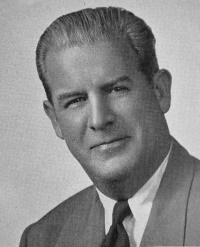

Remmie LeRoy Arnold (25 January 1894–23 June 1971), businessman and civic association leader, was born in Petersburg, the second of three sons and second of four children of Andrew Alexander Arnold and Mary Virginia Arnold. His father was an unskilled laborer, and Remmie Arnold grew up with few advantages. After attending public schools, he went to work at a planing mill in 1907 for three dollars a week. Intelligent and resourceful, willing and able to take responsibility, Arnold subsequently worked for a number of other local businesses before becoming general manager of the Edison Pen Company in Petersburg in 1915. He eventually rose to the firm's presidency and in 1935 established his own R. L. Arnold Pen Company, where he served as president for the rest of his life. It became one of the largest manufacturers of fountain pens and mechanical pencils in the world.
On 27 April 1918 Arnold married Charlia Lawrence Sears, originally of Charleston, South Carolina, at her parents' home in Middlesex, Nash County, North Carolina. They had one son and one daughter. As Arnold's business became more successful, he became more active in civic affairs. He served on the Petersburg City Council from 1936 to 1944 and advocated better housing and recreational facilities for both races in Petersburg. He was one of the first to call attention to the pollution of the Appomattox River, chaired a committee that built an airport for Petersburg, and helped convince the army to reopen Camp Lee in 1940. A dynamic extrovert, Arnold enjoyed the conviviality of fraternal organizations. He served as national president of the Circus Saints and Sinners in 1938–1939, district deputy exalted ruler of the Elks in Virginia in 1944, and national imperial potentate of the Ancient Arabic Order, Nobles of the Mystic Shrine in 1953–1954. He also sat on the Crippled Children Hospitals Board of the Shriners Hospitals of North America.
Arnold's involvement in such organizations led naturally to another public service during World War II. He founded a Petersburg chapter of the National War Dads, an organization established in 1942 to help servicemen keep in touch with their parents and to press the government for better medical treatment in the military and to prepare for postwar medical care, insurance, job training, and education for veterans. Arnold attended the first national convention of the War Dads in 1943 and was elected national president. Reelected in 1944, he personally delivered thousands of pieces of mail from servicemen to their families during extensive travels in England and France as well as in the United States.
In 1949 Arnold campaigned for the Democratic Party nomination for governor of Virginia. His platform was an unusual mixture of pleas for increased public services and criticism of big government. He advocated repealing the poll tax as well as increasing salaries and pensions for public school teachers. He proposed issuing bonds for school construction and argued for additional improvements of the Hampton Roads ports. As a newcomer to elective politics, Arnold had no chance against experienced politicians with extensive networks of supporters. He placed fourth among the four candidates, receiving only about seven percent of the vote.
In spite of the apparently progressive nature of portions of his campaign platform, Arnold was in many other ways a typical conservative southern businessman. As a self-made man he was critical of the welfare state, and as a businessman he disliked governmental intervention in the economy. He was a well-known and highly vocal critic of labor unions. From 1946 to 1947 he served as president of the Southern States Industrial Council, one of the most conservative organizations of southern businessmen, which worked to keep labor unions out of the South and adopted a strong anticommunist stance that appealed to conservative politicians and reinforced opponents of some of the progressive policies Arnold was to advocate in 1949. In spite of his earlier pleas for better schools for African American children, Arnold was allied in the Southern States Industrial Council with many of the business leaders of the South who staunchly defended racial segregation.
During the 1950s and 1960s Arnold withdrew from leadership in partisan organizations to concentrate on his business and fraternal affairs and his Arnolda Ranch in Prince George County. The R. L. Arnold Pen Company remained a family business, and his son, Remmie LeRoy Arnold Jr., succeeded his father as president in 1971 and in 1974 won election to the Petersburg City Council. Remmie LeRoy Arnold died of heart failure on 23 June 1971 and was buried in Blandford Cemetery in Petersburg.
Sources Consulted:
William Moseley Brown, From These Beginnings: The Life Story of Remmie LeRoy Arnold (1953); family history information verified by granddaughter Alexa Arnold Ricketts; Virginia Journal of Education 42 (May 1949): 14, 26; Peter R. Henriques, "The Organization Challenged: John S. Battle, Francis P. Miller, and Horace Edwards Run for Governor in 1949," Virginia Magazine of History and Biography 82 (1974): 372–406; portrait in possession of Mildred Spain Arnold, Petersburg; obituaries in Richmond Times-Dispatch, 24 June 1971, and Petersburg Progress-Index, 24 (portrait), 25 June 1971.
Photograph in Well Done, Rennie! Testimonial Dinner (1948), Library of Virginia.
Written for the Dictionary of Virginia Biography by James R. Sweeney.
How to cite this page:
James R. Sweeney, "Remmie LeRoy Arnold (1894–1971)," Dictionary of Virginia Biography, Library of Virginia (1998– ), published 1998 (http://www.lva.virginia.gov/public/dvb/bio.asp?b=Arnold_Remmie_LeRoy, accessed [today's date]).
Return to the Dictionary of Virginia Biography Search page.


